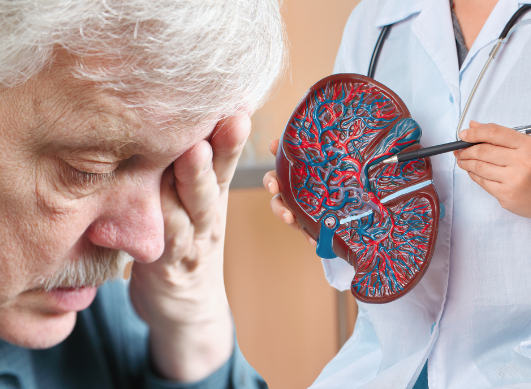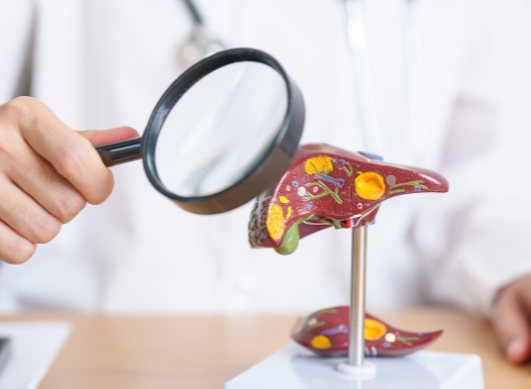- Home
- Forums
- Non-alcoholic fatty liver disease and NASH Forum
- Living with NAFLD and NASH
- Carenity members tell us about their diagnosis of NASH
Patients Non-alcoholic fatty liver disease and NASH
Carenity members tell us about their diagnosis of NASH
- 70 views
- 1 support
- 5 comments
All comments
![]()
livinginSEA
![]()
livinginSEA
Last activity on 11/16/2023 at 1:48 AM
Joined in 2019
21 comments posted | 15 in the Non-alcoholic fatty liver disease and NASH Forum
Rewards
-
Contributor
-
Messenger
-
Explorer
The diagnosis was a relief to put a name to the condition, but it also caused a lot of anxiety and worries. A lot of that initial anxiety was caused by the uncertainty of what the condition meant and involved because I felt my doctor that made the initial diagnosis did a poor job in explaining it.
![]()
idontdrink
Good advisor
![]()
idontdrink
Last activity on 01/30/2023 at 2:48 PM
Joined in 2019
51 comments posted | 35 in the Non-alcoholic fatty liver disease and NASH Forum
Rewards
-
Good Advisor
-
Contributor
-
Messenger
-
Explorer
I had a similar diagnosis experience. No real explanations, lot's of questions without answers and no real guidance on how to proceed. This sort of bad care is an epidemic for people with NASH. I think some health care professionals see this as a "self inflicted" wound and don't take our pain seriously.
![]()
Gemme1
![]()
Gemme1
Last activity on 04/07/2020 at 4:07 PM
Joined in 2019
4 comments posted | 2 in the Non-alcoholic fatty liver disease and NASH Forum
1 of their responses was helpful to members
Rewards
-
Explorer
I totally agree. They give you the diagnosis and your on your own. Even after being an RN for 26 yrs I'm still not sure how to proceed
See the signature
Sandra J Burritt
![]()
Bibi1953
![]()
Bibi1953
Last activity on 07/17/2024 at 6:00 PM
Joined in 2020
3 comments posted | 2 in the Non-alcoholic fatty liver disease and NASH Forum
Rewards
-
Explorer
I didn't feel shock at first because I didn't know what it was. No one knows about this disease but it's everywhere!
![]()
sbrown45
![]()
sbrown45
Last activity on 03/25/2020 at 3:22 PM
Joined in 2020
5 comments posted | 5 in the Non-alcoholic fatty liver disease and NASH Forum
Rewards
-
Explorer
@Gemme1 @Bibi1953 @idontdrink I agree too! I was in complete shock when I was diagnosed because it was just the last think I expected. I had never heard of it before so I wonder if doctors are so bad at relaying the information to us because they don't diagnose it often? Do they not get literature to hand out to patients? Like you all I had basically no info leaving the appointment and had to Google everything in the car on the way home.
Give your opinion
Survey
Survey
Members are also commenting on...
Articles to discover...

12/26/2022 | Nutrition
Maintaining a healthy diet when living with Non-Alcoholic Steatohepatitis (NASH)

12/10/2018 | Testimonial
Bariatric Surgery & Obesity: Psychological Follow-Up, Cost And Effectiveness

12/16/2018 | Testimonial
Encountering many Diagnosis Errors Before Being Diagnosed with Chronic Asthma and NASH
Subscribe
You wish to be notified of new comments
You have been subscribed






Lee__R
Community managerGood advisor
Lee__R
Community manager
Last activity on 04/03/2020 at 5:04 PM
Joined in 2018
1,336 comments posted | 17 in the Non-alcoholic fatty liver disease and NASH Forum
2 of their responses were helpful to members
Rewards
Good Advisor
Contributor
Messenger
Explorer
Friend
Top chef
On average, patients waited 2 years to be diagnosed and the majority consulted just 1 doctor before reaching their diagnosis.
Fortunately for those suffering from NAFLD, the time period to arriving at a diagnosis was not too long, with the average time being 1-2 years from the initial sign of symptoms. During this period, respondents said that they experienced different symptoms with different severities. However, the majority of patients complained of the following symptoms:
Watery/Oily stools | Nausea | Fatigue | Weight gain | Stomach pain | Pain below ribs | Tenderness | Rashes | Vomiting | Elevated liver enzymes | Water retention
Before the diagnosis: the impact of NAFLD
We asked our members about the impacts the symptoms caused by NAFDL had on their daily life before reaching a diagnosis, and this is what they had to say:
The majority of respondents reported that chronic fatigue had the greatest impact on their daily life before the diagnosis. Fortunately, 23% of respondents reported that only one part of their daily life was impacted by the symptoms prior to reaching a diagnosis. Members in general felt that the symptoms impacted their social or professional life the least.
Before diagnosis, only 21% of patients did their own research on the internet concerning their symptoms. A majority of those individuals reported using websites such as the Mayo Clinic, Healthline and the Liver Foundation, while several reported they did their research by typing their symptoms into Google and going from there.
Many respondents didn’t try any alternative therapies for their NAFLD such as homeopathy, with only 15% responding that they did. However, those who did try alternative therapies reported use of milk thistle, acupuncture, turmeric, dandelion root tea, grean tea and essential oils.
Being diagnosed with NAFLD: what you had to say
For many diseases, the road to diagnosis is peppered with a misdiagnosis/misdiagnoses. However, with NAFLD, only 20% of patients had a misdiagnosis before discovering they had NAFLD.
According to Carenity members, they were most frequently misdiagnosed with chronic fatigue syndrome, irritable bowel syndrome (IBS), fibromyalgia, mental illness, gallstones or an endocrine tumor.
Although only 20% of members reported a misdiagnosis, the misdiagnosis did result in causing considerable stress. One member said that they were constantly feeling “frightened for the future” and were in “constant pain”.
The shock of the diagnosis
How did patients react to their diagnosis?
Finding out that you have NAFLD can be a frightening event, but 39% said they did not experience any particular sentiment whilst 11% of patients can’t remember how they felt at all.
The role of doctors and healthcare professionals
The role of the healthcare professional making the diagnosis is key. Sometimes patients do not feel sufficiently listened to or informed about their condition. The good news is that the majority of Carenity members felt that their doctor took time in discussing with them their NAFLD diagnosis while also being calm and emphatic. The main problem members felt with their medical care was the feeling that the practitioner didn’t care and they they were cold and distant delivering the diagnosis.
Some comments from respondents said that they appreciated that their doctor was "straight forward" while another described the delivery as being “blunt”. Two respondents claimed their doctor pressured them to admit they drink alcohol, when that certainly was not the case.
Fortunately, over all, the majority of respondents had positive feedback regarding their medical care and doctor, with most of them being encouraged to lose weight and make lifestyle changes.
>> Read our article about diet, exercise and NAFLD <<
43% - The doctor was very calm
33% - The doctor took the time to explain
23% - The doctor was very emphatic
2% - The doctor offered offered psychological support
21% - They looked like they didn’t care
16% - They were cold and distant
14% - They used cold and scientific language
13% - They were too fast explaining
The patient's struggle when facing NAFLD...
We asked our members how they felt emotionally after receiving their diagnosis, whether they felt renewed with determination now that they had a name for their symptoms/condition, or whether they felt despair for their future medical journey. Many members responded having felt several emotions at once and this is what they had to say:
27% of patients felt relieved by the diagnosis, but this was coupled with 43% feeling a great deal of anxiety. This anxiety was coupled with shock and surprise, according to 36% of respondents.
15% reported feeling lost, confused and alone; 17% felt anger about their diagnosis; 15% of patients felt they were being misunderstood; 21% felt discouraged.
Unfortunately, only 21% felt determined to fight the disease and 3% had confidence for the future while 19% felt despair.
How can diagnosing NAFLD be improved?
The above statistics about how patients felt following their diagnosis paints a "not so great" picture for those facing a diagnosis of NAFLD. We asked our members how they felt the process could be improved and a lot of respondents said they would have appreciated more support following the initial diagnosis.
More Information
The most resounding suggestion in improving the journey with a diagnosis of NAFLD is to simply provide the patient with more information about their NAFLD, what they can expect going forward, and how to manage it. This is what some members had to say:
"It should be explained what it is and why you have it and what can be done through diet, exercise or meds."
and
"An explanation about treating it. I got none and had to look it up myself."
Patients want their doctor to, “Bring patients back into the office and explain everything and offer tips to help with it other than just change your diet.”
In brief
Patients feel that their doctor should spend more time explaining to them what NAFLD implies and how they can manage the disease. One member said that they “weren’t aware it was a serious problem” because their doctor didn’t talk them through what was really going on.
Members want more detailed information and support from their healthcare providers, so that they don’t feel lost and discouraged going forward.
And what is your story?
Let's share our experiences and that of our loved ones in the comments on this article to improve diagnosis and cure NAFLD!